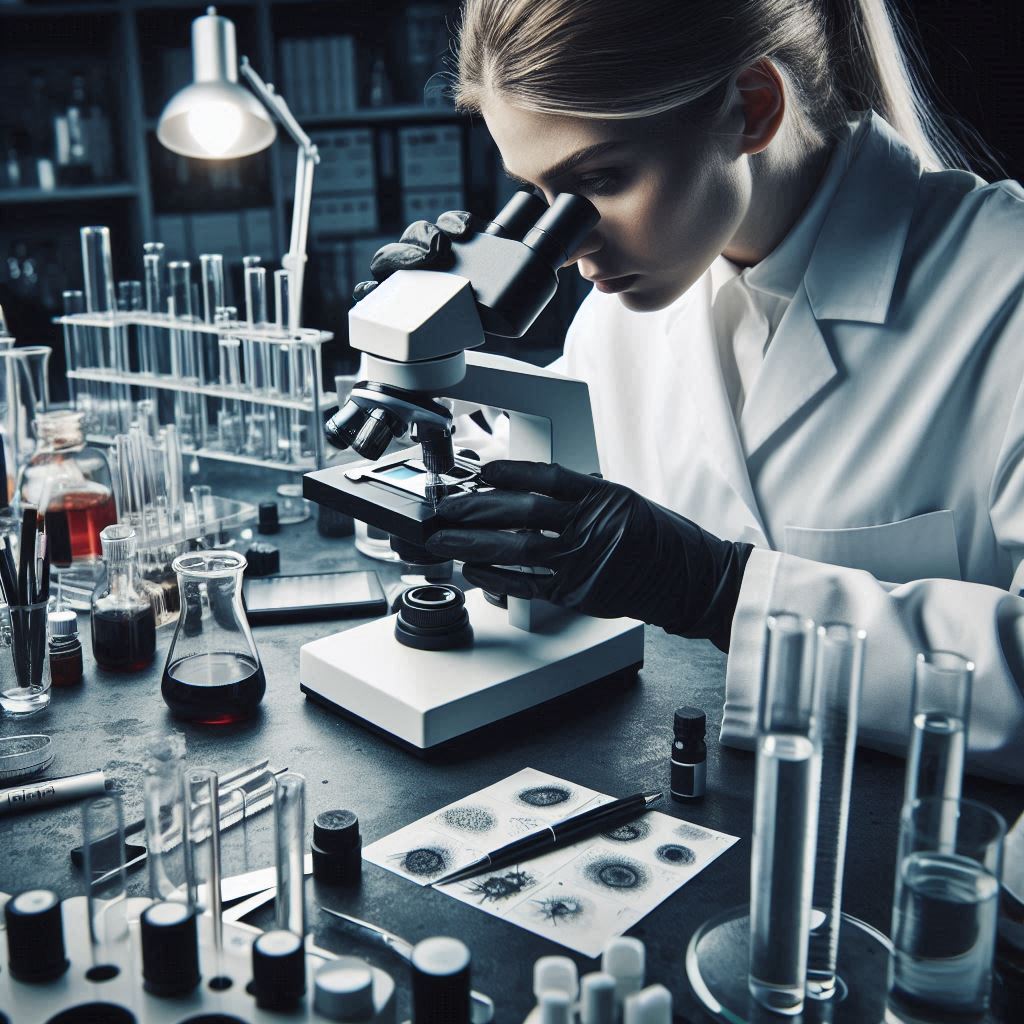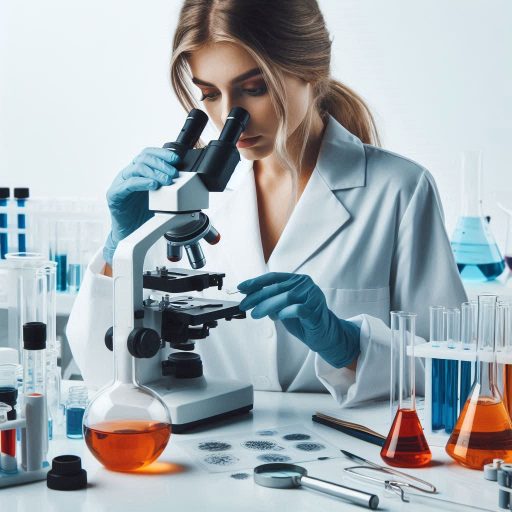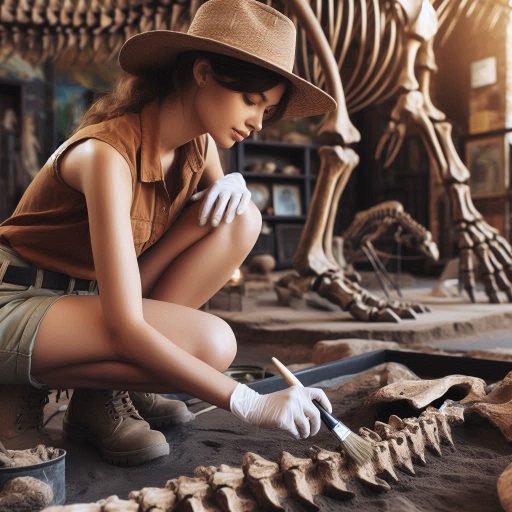Introduction
Forensic science involves analyzing physical evidence to solve crimes.
Understanding the differences between forensic science and criminology is crucial.
Forensic science focuses on evidence collection, analysis, and interpretation.
Criminology, on the other hand, deals with understanding criminal behavior.
It is essential to distinguish between the two fields for effective crime solving.
Forensic scientists work with physical evidence such as DNA, fingerprints, and weapons.
Criminologists study the motives, psychology, and patterns of criminal behavior.
Forensic science helps in identifying suspects and linking them to crime scenes.
Criminology provides insights into why individuals commit crimes in the first place.
Both fields play a vital role in the criminal justice system, but in different ways.
Forensic science uses scientific methods to solve crimes and provide evidence in court.
Criminology focuses on understanding the root causes of criminal behavior.
By understanding the differences, professionals can collaborate effectively in criminal investigations.
Forensic scientists and criminologists work together to create a comprehensive understanding of crimes.
Collaboration between the two fields can lead to more successful criminal investigations.
Therefore, forensic science and criminology are distinct yet complementary fields in criminal justice.
Definition and Scope of Forensic Science
Definition of Forensic Science
Forensic science refers to the application of scientific methods and techniques in law enforcement.
It encompasses various fields that help identify, analyze, and interpret evidence.
Forensic scientists work with law enforcement to provide accurate information that can be presented in court.
Their expertise ensures that justice is served based on factual evidence.
Various Disciplines within Forensic Science
Forensic science comprises several specialized disciplines.
Each discipline focuses on a specific type of evidence or analysis.
Forensic biology examines biological materials such as blood, hair, and other bodily fluids.
Scientists in this field use DNA analysis to identify individuals and establish connections to crime scenes.
Forensic toxicology plays a crucial role in determining the effects of substances on individuals.
Toxicologists analyze bodily fluids for the presence of drugs, alcohol, and poisons.
Their findings help establish whether substances contributed to a crime or affected a victim’s behavior.
Forensic chemistry focuses on analyzing chemical substances found at crime scenes.
This includes identifying unknown powders, explosives, and residue.
Forensic chemists often provide insights into drug-related crimes and environmental hazards.
Another essential discipline is forensic anthropology.
Forensic anthropologists specialize in analyzing human skeletal remains.
They help identify victims and provide insights into cause of death.
Forensic odontology involves the examination of dental records and bite marks.
Forensic odontologists can identify victims through dental records or analyze bite mark evidence left on victims.
Role of Forensic Science in the Criminal Justice System
Forensic science plays a critical role in the criminal justice system.
It helps law enforcement agencies collect and analyze evidence effectively.
Forensic scientists provide expert testimony in court, translating complex findings into understandable language.
Their work establishes the credibility of evidence, influencing case outcomes.
Forensic science also aids in exonerating innocent individuals.
Advances in DNA analysis have led to the release of wrongfully convicted persons.
By re-examining evidence with modern techniques, forensic scientists can provide new insights into old cases.
Moreover, forensic science enhances public safety.
By understanding criminal behavior through forensic evidence, law enforcement can develop preventive measures.
This proactive approach helps reduce crime rates and protect communities.
Basically, forensic science is essential to the criminal justice system.
It encompasses various disciplines that analyze evidence to solve crimes.
By applying scientific methods, forensic scientists contribute to ensuring justice and public safety.
Understanding the differences between forensic science and criminology helps clarify each field’s unique roles in criminal investigations.
Read: Interdisciplinary Research: Botany and Other Sciences
Definition and Scope of Criminology
Definition of Criminology
Criminology is the scientific study of crime, criminal behavior, and the criminal justice system.
It encompasses a wide range of disciplines, including sociology, psychology, law, and statistics.
Criminologists analyze the causes and consequences of crime, as well as the effectiveness of policies and interventions aimed at preventing and reducing criminal behavior.
Focus on the Study of Crime, Criminal Behavior, and the Criminal Justice System
Criminology focuses on understanding the nature of crime, why people commit crimes, and how the criminal justice system responds to criminal behavior.
It explores the social, psychological, and environmental factors that contribute to criminal conduct, as well as the impact of crime on individuals, communities, and society as a whole.
Importance of Criminology in Understanding and Preventing Crime
Criminology plays a crucial role in understanding the root causes of crime and developing strategies to prevent and combat criminal behavior.
By studying patterns of crime, analyzing risk factors, and evaluating interventions, criminologists can help law enforcement agencies.
Policymakers, and communities make informed decisions about crime prevention and criminal justice policies.
Ultimately, the goal of criminology is to create safer and more just societies by reducing crime rates and improving the overall effectiveness of the criminal justice system.
Basically, criminology is a dynamic and multidisciplinary field that examines the complex nature of crime and criminal behavior while also seeking to enhance public safety and promote social justice.
By exploring the causes and consequences of crime, criminologists help inform evidence-based practices and policies that aim to prevent crime, rehabilitate offenders, and support victims.
Through research, analysis, and advocacy, criminology continues to make valuable contributions to our understanding of crime and the criminal justice system.
Ultimately contributing to a safer and more equitable society.
Read: Women in Botany: Celebrating Pioneers and Leaders
Educational Background and Training
Academic Requirements for Forensic Scientists
To become a forensic scientist, you typically need a relevant degree.
Many universities offer undergraduate degrees in forensic science, biology, or chemistry.
These programs provide essential knowledge about the scientific principles involved in evidence analysis.
Some forensic scientists pursue advanced degrees for specialized roles.
Laboratory experience is crucial in forensic science education.
Many programs include hands-on training in crime labs.
This experience enhances students’ practical skills and prepares them for real-world scenarios.
Students must also understand various forensic techniques.
This includes DNA analysis, toxicology, and ballistics.
Familiarity with these techniques is essential for analyzing crime scene evidence effectively.
Skills and Knowledge Needed for a Career in Forensic Science
Forensic scientists must possess strong analytical skills.
They need to interpret complex data and draw accurate conclusions.
Attention to detail is vital, as even small errors can compromise evidence.
Communication skills are also important.
Forensic scientists often present findings in court.
They must convey complex scientific concepts in a clear manner.
Additionally, forensic scientists should be proficient in using specialized equipment.
This includes DNA extraction kits, spectrophotometers, and microscopes.
Mastery of these tools is critical for conducting thorough analyses.
Academic Requirements for Criminologists
Criminologists typically require a degree in criminology, sociology, or psychology.
These programs focus on understanding criminal behavior and societal influences.
Students learn about crime theory, social justice, and criminal justice systems.
Many criminologists pursue graduate degrees to enhance their expertise.
Advanced studies often cover specific areas like criminal profiling or juvenile delinquency.
These specialized degrees prepare students for roles in research, policy-making, and advocacy.
Skills and Knowledge Needed for a Career in Criminology
Criminologists must possess strong research and analytical skills. They analyze crime data to identify trends and patterns.
This research helps inform public policy and crime prevention strategies.
Additionally, criminologists should have excellent communication skills.
They often work with diverse stakeholders, including law enforcement and community organizations.
Being able to present findings clearly is essential for effective collaboration.
Critical thinking is also a necessary skill.
Criminologists must evaluate different perspectives on crime and justice.
This ability allows them to develop well-rounded solutions to complex issues.
In general, forensic science and criminology require different academic backgrounds and skills.
Forensic scientists focus on scientific analysis of evidence, while criminologists study the social aspects of crime.
Understanding these distinctions can guide aspiring professionals in choosing their career paths.
Both fields play crucial roles in the justice system, and each offers unique opportunities for impact.
Read: How Climate Change Is Impacting Plant Research

Objectives and Goals
Objectives of Forensic Science
Forensic science aims to solve crimes through scientific methods.
Its primary objective is to provide reliable evidence for criminal investigations.
Forensic scientists analyze physical evidence from crime scenes, such as fingerprints, blood, and fibers.
They employ various techniques, including DNA analysis and toxicology, to gather essential information.
Another critical objective is to assist in court proceedings.
Forensic scientists present their findings as expert witnesses.
Their testimony helps juries understand the scientific evidence behind a case.
The reliability of forensic science can significantly influence court outcomes.
By ensuring that evidence meets legal standards, forensic scientists contribute to a fair judicial process.
Moreover, forensic science focuses on maintaining the integrity of evidence.
Chain of custody protocols ensure that evidence remains untainted from collection to courtroom.
This meticulous approach strengthens the credibility of forensic findings in legal settings.
Overall, the objectives of forensic science center around solving crimes and supporting the justice system with scientific evidence.
Goals of Criminology
Criminology differs from forensic science in its focus and goals.
The primary goal of criminology is to understand criminal behavior.
Criminologists study the psychological, social, and economic factors that drive individuals to commit crimes.
They analyze patterns in criminal behavior to identify root causes and trends.
Developing crime prevention strategies is another key goal of criminology.
Criminologists work to create effective interventions that reduce crime rates.
They may conduct research on community programs or law enforcement strategies.
By understanding the motivations behind criminal activity, criminologists contribute to developing policies that enhance public safety.
Additionally, criminology examines the effects of crime on victims and society.
This holistic approach helps inform public policy and law enforcement practices.
By identifying societal factors contributing to crime, criminologists can propose effective solutions.
Overall, the goals of criminology revolve around understanding crime and promoting safety through prevention.
Transform Your Career Today
Unlock a personalized career strategy that drives real results. Get tailored advice and a roadmap designed just for you.
Start NowCollaboration Between Forensic Science and Criminology
Forensic science and criminology often collaborate within the criminal justice system.
While forensic science provides the evidence needed for investigations, criminology offers insights into criminal behavior.
Together, these disciplines enhance the effectiveness of criminal investigations.
Forensic scientists may work alongside criminologists during criminal investigations.
They rely on forensic evidence to support theories about a suspect’s motives or actions.
Criminologists, in turn, can use forensic findings to further their research on criminal patterns.
Moreover, collaboration between the two fields helps develop comprehensive crime prevention strategies.
By understanding both the evidence and the underlying behaviors, law enforcement can create more effective interventions.
This partnership ultimately strengthens the criminal justice system and enhances public safety.
Generally, forensic science and criminology serve distinct yet complementary roles.
Forensic science focuses on solving crimes and providing evidence, while criminology seeks to understand criminal behavior and develop prevention strategies.
Their collaboration enriches the criminal justice system, ensuring a more effective response to crime.
Read: Exploring the Different Branches of Geology
Tools and Techniques
Tools and Techniques Used in Forensic Science
Forensic science relies on specialized tools and techniques to analyze evidence.
DNA analysis is a critical method for identifying individuals.
This technique helps solve crimes by matching DNA samples to known individuals.
Fingerprinting is another essential tool used to link suspects to crime scenes.
Forensic experts collect and analyze fingerprints left on surfaces.
Ballistics examines firearms and ammunition related to crimes.
This field studies bullet trajectories and cartridge cases.
Forensic scientists use ballistics to determine how a shooting occurred.
Other techniques include toxicology tests to detect drugs or poisons in biological samples.
Each of these methods plays a vital role in solving crimes and supporting legal cases.
Tools and Techniques Used in Criminology
Criminology employs different tools and techniques to study crime and criminal behavior.
Surveys are a common method for gathering data about criminal activity.
Researchers design surveys to understand public perceptions and experiences with crime.
Interviews also provide qualitative insights into criminal behavior.
Through interviews, criminologists explore the motivations and backgrounds of offenders.
Statistical analysis is essential in criminology for interpreting data trends.
This analysis helps identify patterns in crime rates over time.
Criminologists use software tools to analyze large data sets and visualize findings.
They often apply statistical models to predict future criminal activity and evaluate crime prevention strategies.
How These Tools and Techniques Differ in Each Field
The tools and techniques used in forensic science and criminology serve different purposes.
Forensic science focuses on physical evidence and its analysis.
Its methods are hands-on and often conducted in a laboratory.
Techniques like DNA analysis and fingerprinting directly connect suspects to crimes.
In contrast, criminology examines broader societal issues related to crime.
Its tools are more qualitative and rely on data collection methods.
Surveys and interviews gather information about societal perceptions and behaviors.
While forensic science seeks to solve individual cases, criminology aims to understand crime’s root causes and impacts.
Additionally, the outcomes of these two fields differ significantly.
Forensic science results in tangible evidence used in court.
This evidence supports legal proceedings and helps achieve justice for victims.
Conversely, criminology produces theories and models that inform public policy and prevention strategies.
In summary, forensic science and criminology use distinct tools and techniques.
Forensic science focuses on laboratory analysis of physical evidence.
Criminology emphasizes data collection and analysis to understand crime.
Both fields are essential, yet they approach crime from different angles.
Understanding these differences enhances our appreciation of their contributions to the justice system.
See Related Content: Bioinformatics: Key Challenges and Future Trends
Career Opportunities
Career Opportunities in Forensic Science
Forensic science offers diverse career opportunities for individuals passionate about solving crimes.
Forensic technicians play a crucial role in collecting and analyzing evidence from crime scenes.
They often work closely with law enforcement, documenting details and preserving evidence.
This position requires strong attention to detail and excellent observational skills.
Another prominent role in forensic science is that of a forensic pathologist.
These professionals conduct autopsies to determine causes of death.
They analyze tissues and fluids to provide essential information in homicide investigations.
A medical degree and specialized training in pathology are necessary for this career.
Forensic scientists can also specialize in various fields, such as toxicology, biology, or chemistry.
Each specialization focuses on different aspects of evidence analysis.
These specialists often work in laboratories, using advanced techniques and technology to analyze samples.
As the demand for forensic analysis continues to grow, job prospects in this field remain strong.
Career Opportunities in Criminology
Criminology presents a different set of career opportunities for those interested in understanding crime and its causes.
Crime analysts gather and interpret data to identify crime patterns and trends.
They use statistical methods to inform law enforcement strategies and policies.
Strong analytical skills and proficiency in data analysis software are essential for this role.
Another significant career in criminology is that of a criminal profiler.
Profilers study criminal behavior and patterns to assist in investigations.
They analyze evidence, motives, and psychological factors to create profiles of suspects.
This role requires a deep understanding of psychology and criminal behavior.
Other criminology careers include roles in research, policy development, and crime prevention programs.
Professionals in this field often work with government agencies, non-profits, or academic institutions.
Their work contributes to developing effective strategies for reducing crime and improving community safety.
Job Prospects and Salary Expectations in Each Field
Both forensic science and criminology offer promising job prospects.
Forensic science jobs are expected to grow due to increasing demand for forensic analysis in criminal investigations.
According to the Bureau of Labor Statistics (BLS), forensic technicians earn an average salary of around $60,000 annually.
Forensic pathologists, with their extensive training, can earn significantly more, with salaries averaging over $100,000.
In criminology, the job market is also expanding.
Crime analysts typically earn around $65,000 per year, depending on their experience and location.
Criminal profilers, due to their specialized skill set, may earn salaries ranging from $75,000 to over $100,000 annually.
Overall, both fields offer rewarding career paths.
Those interested in the scientific analysis of crime may find forensic science appealing.
Conversely, individuals drawn to understanding crime patterns and prevention might prefer criminology.
Each path has unique challenges and rewards, making both essential in the criminal justice system.
Public Perception and Media Representation
How Forensic Science is Portrayed in Popular Culture
Forensic science has become a major focus of many crime dramas, like CSI, Bones, and Dexter.
These shows often portray forensic scientists as solving cases within a single episode.
They highlight high-tech labs, rapid DNA analysis, and detailed crime scene reconstructions.
Forensic scientists are shown collecting, processing, and analyzing evidence with incredible speed and accuracy.
However, the fast-paced nature of these shows creates an unrealistic depiction of forensic science.
In reality, forensic investigations take much longer, often spanning weeks or months.
TV shows also exaggerate the abilities of forensic technology.
For example, DNA results are shown as instant, when in truth, they can take days or weeks to process.
While forensic science is important in criminal investigations, it is only one part of a larger process.
These fictional portrayals also emphasize the glamour of forensic work.
Popular shows depict forensic scientists working in pristine, state-of-the-art labs.
They present the role as thrilling and action-packed, which contrasts with the meticulous, often slow nature of real-life forensic analysis.
How Criminology is Portrayed in Popular Culture
Criminology, on the other hand, is often portrayed through true crime documentaries, podcasts, and investigative reports.
Shows like Mindhunter or podcasts like Serial focus more on criminal behavior, motives, and societal impacts.
Criminologists are portrayed as profiling criminals, analyzing psychological factors, and studying crime trends.
Popular culture often depicts criminologists as working closely with law enforcement to create criminal profiles.
However, this portrayal simplifies the complex nature of criminology.
In reality, criminologists study broader patterns of crime, including socioeconomic factors, mental health, and criminal justice policies.
Unlike forensic science, which focuses on physical evidence, criminology is a social science that examines the causes and effects of crime.
Documentaries and podcasts often dive deep into the criminal mind and motivations, but they rarely showcase the research or theoretical work that criminologists do.
Impact of Media Representation on Public Understanding
The media’s representation of both forensic science and criminology impacts how the public perceives these fields.
Popular culture often leads people to believe that forensic scientists and criminologists solve crimes quickly and independently.
This oversimplification creates unrealistic expectations about criminal investigations and their timelines.
Forensic TV shows have led to what‘s called the ‘CSI Effect,‘ where juries expect more forensic evidence in trials.
Jurors may believe DNA or fingerprint evidence should be present in every case, despite the rarity of such evidence.
This can affect courtroom decisions and the overall perception of justice.
Criminology‘s portrayal in true crime media has sparked public interest in criminal profiling and the psychology behind crimes.
However, it can lead people to believe that catching criminals is solely about understanding their minds, when in reality, it involves much more than that.
This oversimplification can distort the understanding of crime prevention and justice.
Delve into the Subject: Anthropology Careers: Salary and Job Outlook
Conclusion
Forensic science and criminology represent two distinct yet complementary fields within the criminal justice system, each playing a crucial role in addressing crime and delivering justice.
Forensic science focuses on the scientific analysis of physical evidence, using tools like DNA analysis, toxicology, and fingerprinting to solve crimes and identify suspects.
Criminology, on the other hand, explores the sociological and psychological aspects of crime, studying criminal behavior, the causes of crime, and societal responses to it.
These differences highlight the specialized nature of each field and their unique contributions to the broader goal of crime resolution.
Recognizing the distinct roles of both forensic science and criminology is essential for understanding how the criminal justice system operates effectively.
Forensic scientists provide the technical expertise needed to process crime scenes, analyze evidence, and offer objective findings that can be used in court.
Criminologists, meanwhile, offer insights into patterns of criminal behavior, working to identify root causes and inform policies that can prevent crime.
Both fields are vital to solving cases and shaping long-term crime prevention strategies.
While forensic scientists may focus on individual cases, criminologists often take a broader view, helping to shape law enforcement approaches and develop preventive measures based on social and psychological factors.
[E-Books for Sale]
The Big Book of 500 High-Paying Jobs in America: Unlock Your Earning Potential
$19.99 • 500 High-Paying Jobs • 330 pages
Explore 500 high-paying jobs in America and learn how to boost your career, earn more, and achieve success!
See All 500 High-Paying Jobs of this E-Book
1001 Professions Without a Degree: High-Paying American Jobs You Can Start Now
$19.99 • 1001 Professions Without a Degree • 174 pages
Discover 1001 high-paying jobs without a degree! Unlock career tips, skills, and success strategies for just $19.99!




